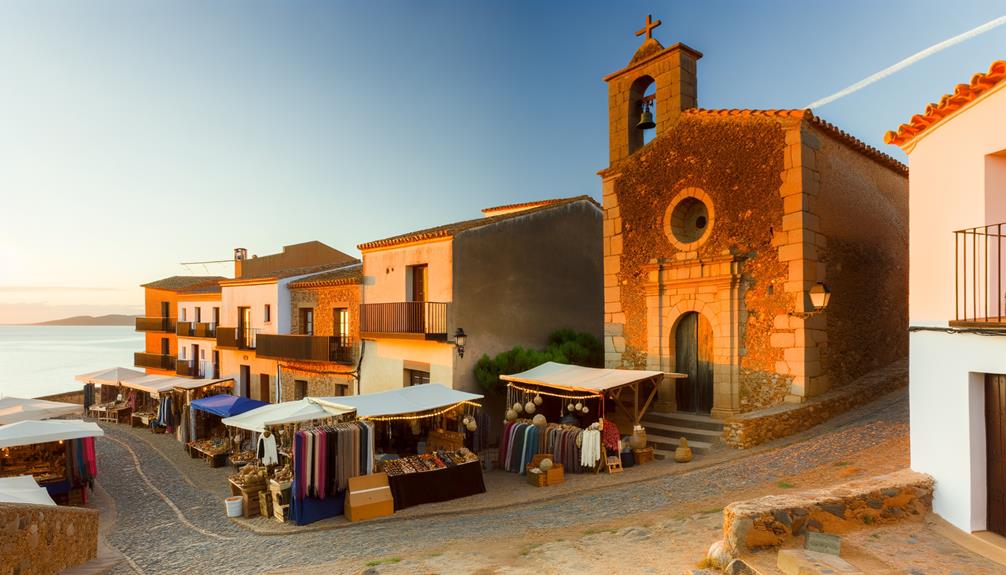Miguel Name Meaning and Origin
Miguel is derived from the Hebrew name Mikha'el, meaning 'Who is like God?' This rhetorical question emphasizes divine uniqueness. The name shifted to Miguel through Latin influences, arriving in the Iberian Peninsula during early Christianization.
Miguel is closely associated with the archangel Michael, central to Judeo-Christian traditions, solidifying its cultural and religious significance. Widely used in Spanish-speaking countries, notably popularized by figures such as author Miguel de Cervantes and revolutionary Miguel Hidalgo.
The name's enduring appeal reflects its deep historical roots and theological gravitas. Discover more about its journey through time and across cultures.

Key Takeaways
- 'Miguel' originates from the Hebrew name 'Mikha'el,' meaning 'Who is like God?'
- The name spread to Spain through early Christianization and Latin influences.
- 'Miguel' is associated with Archangel Michael in Judeo-Christian traditions.
- The name is popular in Spanish-speaking countries and has a rich cultural heritage.
- Notable figures named Miguel include Miguel de Cervantes and Miguel Hidalgo y Costilla.
Historical Roots
The name 'Miguel' has its historical roots in the Hebrew name 'Mikha'el,' which means 'Who is like God?' This name has a profound historical significance, as it comes from ancient Hebrew traditions and texts.
The evolution of 'Mikha'el' into 'Miguel' occurred through linguistic changes, influenced by various cultures and languages over centuries. The name 'Miguel' entered the Iberian Peninsula through Latin, subsequently becoming widespread in Spain and Portugal. As a result, it became a common name in Spanish and Portuguese-speaking regions.
The name's biblical origins and its association with the archangel Michael further solidified its use and reverence. This historical transformation underscores the enduring impact of ancient names on contemporary naming practices.
Hebrew Origins
Originating from the ancient Hebrew name 'Mikha'el,' the name 'Miguel' embodies a profound theological question, 'Who is like God?'
This name is derived from three Hebrew elements: 'mi' (who), 'ka' (like), and 'El' (God), forming a rhetorical inquiry that underscores the unparalleled nature of the divine.
Historically, 'Mikha'el' is associated with the archangel Michael, a significant figure in Judeo-Christian traditions who serves as a protector and leader of the heavenly hosts.
The name's etymology reflects a deep reverence for the divine and a recognition of God's supremacy. Its adoption into various cultures highlights the universal appeal and spiritual resonance of its original Hebrew roots, maintaining its theological significance across epochs.
Spanish Influence
Adopted into the Spanish language through cultural and religious transmission, the name 'Miguel' retained its theological gravitas while becoming deeply ingrained in Hispanic heritage. The name's introduction to the Iberian Peninsula can be traced back to the early Christianization of Spain, where it was embraced due to its association with the archangel Michael.
Over time, 'Miguel' evolved into a common given name, symbolizing both spiritual and cultural identity in Spanish-speaking countries.
Key historical influences on the name's prominence include:
- Medieval Christianization: The name spread widely during the Reconquista.
- Literary Usage: Influential works by authors such as Miguel de Cervantes.
- Colonial Expansion: Spanish explorers and settlers carried the name to the Americas.
This rich historical tapestry solidifies 'Miguel' as a timeless symbol of Spanish legacy.
Religious Significance
The name Miguel finds profound roots in religious contexts, primarily linked to the Archangel Michael, a significant figure in Judeo-Christian traditions.
Historically, Michael is venerated as a protector and leader of the heavenly armies, which enhances the name's spiritual resonance.
Additionally, numerous saints named Miguel further underscore its enduring religious importance.
Biblical Roots Explored
Rooted deeply in religious tradition, the name Miguel is the Spanish form of Michael, a name of significant biblical importance. Its etymology can be traced to the Hebrew name מִיכָאֵל (Mikha'el), which translates to 'Who is like God?'. This rhetorical question emphasizes the unparalleled nature of the divine.
- Historical Context: The name Michael appears several times in the Bible, primarily in the Old Scripture.
- Etymological Analysis: Mikha'el combines 'Mi' (who), 'cha' (like), and 'El' (God).
- Religious Significance: Michael is often depicted as a protector and leader of the heavenly host.
Understanding these roots provides a deeper appreciation of the name Miguel, reflecting its profound spiritual heritage.
Archangel Michael Connection
Frequently revered in Christian theology, Archangel Michael holds a pivotal role as a celestial protector and leader of the heavenly armies. His name, derived from the Hebrew 'Mikha'el,' translates to 'Who is like God?' This rhetorical question underscores his unparalleled status among angels.
Historically, Michael's significance is profound, appearing in texts such as the Book of Daniel, where he is depicted as the protector of Israel, and the Book of Revelation, where he leads the battle against the forces of evil.
The etymological connection between 'Miguel' and 'Michael' reflects this storied lineage, imbuing the name with a sense of divine guardianship and strength. Understanding this context enriches the appreciation of the name Miguel's religious significance.
Patron Saint Influence
Miguel's spiritual significance further extends through its association with Saint Michael, who is venerated as a patron saint in various Christian traditions. Saint Michael, an archangel, holds a prominent place in religious texts and lore, symbolizing protection, justice, and spiritual warfare. His influence has inspired the use of the name Miguel across cultures, embedding it with deep religious connotations.
Saint Michael's role includes:
- Defender against evil: Often depicted as a warrior angel defeating Satan.
- Patron of soldiers and police: Revered for his protective qualities.
- Guardian of the Church: Celebrated for his role as protector of the faithful.
The name Miguel carries a heritage rich in spiritual and historical significance, resonating deeply within Christian communities.
Famous Bearers
The name Miguel has been borne by several notable figures throughout history, each contributing to its enduring legacy. Historical figures such as Miguel de Cervantes, the acclaimed Spanish author of 'Don Quixote,' have cemented its cultural significance, while contemporary celebrities like the American R&B singer Miguel have brought modern recognition to the name.
This section explores the impact of these and other prominent individuals named Miguel on various fields and eras.
Historical Figures Named Miguel
Throughout history, several influential figures named Miguel have left an indelible mark on various domains such as literature, politics, and the arts. Their contributions have spanned centuries and continents, showcasing the widespread impact of individuals bearing this name.
- Miguel de Cervantes: Often regarded as the greatest writer in the Spanish language, his seminal work 'Don Quixote' has influenced countless literary traditions.
- Miguel Hidalgo y Costilla: Known as the father of Mexican independence, he played a pivotal role in initiating the Mexican War of Independence against Spanish rule.
- Miguel Ángel Asturias: A Nobel Prize-winning Guatemalan writer and diplomat, his works are celebrated for their profound exploration of Latin American culture and identity.
These individuals exemplify the remarkable legacy associated with the name Miguel.
Celebrities With Name Miguel
In contemporary popular culture, the name Miguel is borne by several prominent celebrities who have made significant contributions to music, film, and sports.
Among them, Miguel Jontel Pimentel, known mononymously as Miguel, stands out in the music industry with his innovative blend of R&B, funk, and hip-hop.
In the domain of cinema, Miguel Ferrer, an American actor, is remembered for his impactful roles in both television and film.
In sports, Miguel Cabrera, a Venezuelan professional baseball player, has earned acclaim for his exceptional career in Major League Baseball.
These individuals exemplify the versatility and global reach of the name Miguel, demonstrating its cultural resonance and enduring appeal across diverse fields of achievement.
Popularity Over Time
Examining the historical trajectory of the name Miguel reveals fluctuations in its popularity influenced by cultural, religious, and social factors. Rooted in the Hebrew name Michael, which means 'Who is like God?', Miguel's prominence has varied across different eras and regions.
Historical context provides insight into its enduring appeal:
- Religious Significance: The association with Archangel Michael has bolstered its use within Christian communities.
- Cultural Influence: Latin American countries have traditionally favored the name, reflecting its deep-rooted heritage.
- Modern Trends: Recent decades have seen a resurgence, partly driven by notable public figures and media representation.
Understanding these elements helps elucidate why Miguel remains a beloved choice for parents across the globe.
Cultural Impact
Miguel's cultural impact is deeply intertwined with the historical and social narratives of Spanish-speaking countries. Originating from the Hebrew name Michael, meaning "Who is like God?", Miguel has been a prevalent figure in religious, literary, and political contexts. Saints, especially Saint Michael the Archangel, have bolstered its significance within Catholic traditions. The name also resonates in literature, with Miguel de Cervantes' seminal work, "Don Quixote," marking a cornerstone in Western literature. Politically, figures like Miguel Hidalgo y Costilla, a leader in the Mexican War of Independence, have further ingrained the name in cultural memory.
| Context | Notable Figure | Impact |
|---|---|---|
| Religious | Saint Michael the Archangel | Spiritual and protective role |
| Literary | Miguel de Cervantes | Foundational literary impact |
| Political | Miguel Hidalgo y Costilla | Symbol of independence |
Modern Usage
Today, the name Miguel continues to be widely used across various cultures, maintaining its historical roots while adapting to contemporary contexts. Its enduring popularity can be attributed to its deep historical significance and adaptability in various linguistic environments.
Derived from the Hebrew name Michael, meaning 'Who is like God?', Miguel retains strong religious and cultural resonance.
Modern usage of Miguel spans across different domains:
- Popularity in Spanish-speaking countries: Miguel remains a top choice for boys in Spain and Latin America.
- Influence in arts and entertainment: Numerous actors, musicians, and writers bear the name, enhancing its contemporary appeal.
- Global presence: The name has found acceptance beyond its traditional borders, reflecting multicultural integration.
Such factors underscore Miguel's sustained relevance in modern times.
Conclusion
The name Miguel, deeply rooted in Hebrew origins and enriched by Spanish influence, carries profound religious significance and historical resonance. Over centuries, its cultural impact has been marked by notable bearers and fluctuating popularity.
Like a timeless river carving its path through history, Miguel's legacy endures, reflecting a blend of faith, heritage, and identity. The name continues to be a poignant emblem of cultural and spiritual continuity in modern times.






